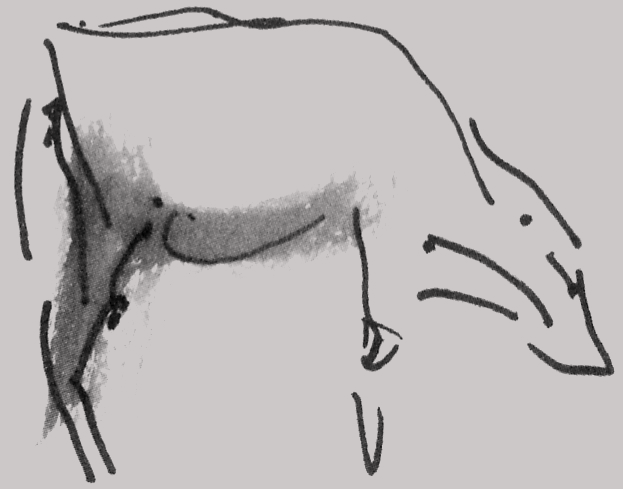Poetry & Poetics
Finding Out a Joy
As I walked out this May morning
I heard the Blackbird
calling from the wood
and there without a word
the Bluebells spread and I said
look at me you pure inquisitors
and this they did –
their mute gaze finding out a joy
I’d too long shaded from the view
and as the Blackbird
carolled in the sunlit glade
I wept for being seen through.

The Aleph
What better place to start than with the letter A. The beginning of learning and the door of heaven, is what that madman Christopher Smart called it. Its shape comes from the head of an Ox, they say, and ‘Ox’, according to my dictionary, is, 1: Any bovine animal. 2: Castrated male of the domestic species. It was Smart’s strong conviction that there is life in language, a generative power. The current view of the matter, however, would go along with the gelded version, holding that language is a domestic arrangement, an information technology which in itself is devoid of life and mystery. I suppose that ever since people began to think about language, instead of simply living inside the spell of it, a tension has existed between these two views – the magical and the rational. Perhaps the very act of thinking about words is what severs the Ox from its magic potency. That; or in encountering some untamed element of the Aleph we do indeed stand in jeopardy of being tossed into a madness.
Weak-minded people, wrote Arthur Rimbaud, beginning by thinking about the first letter of the alphabet, would soon rush into madness. In the overweening confidence of his youth when, by his own confession, he considered himself Magus or Angel, exempt from all morality, he made that famous sonnet in which he claims that each vowel has a colour, and that the sounding of them conjures up images in the mind: A, black velvety jacket of brilliant flies which buzz around cruel smells, gulfs of shadow. Following a deliberate path of poetic initiation, he battered at the conventions imposed on language by the one-eyed intellect until its vowels became for him five Halleluiahs heralding a change of consciousness. One must be deader than a fossil, he wrote, to finish a dictionary in any language.
And yet only a couple of years later, at the point of renouncing poetry altogether, he dismissed his ‘Alchemy of the Word’ with its rules for the form and movement of each consonant as one of his follies. I can understand why he did so. He was, for sure, rushing into madness through his rational disordering of all the senses. But I am not prepared to admit that he merely invented this relationship between words and movement, sound and image. Was it folly when he wrote, The first adventure on the path was when a flower told me its name? I don’t believe so, even though, in leaving his tormented adolescence behind, he felt the need to spurn such magic. I, too, seek such a communion through language, and this is served by attending to the cadence of each line and sentence and to the colour of every sound in context until language becomes a substance shared as well as a communication about a subject.
How could I dismiss it when, in the depth of their craft, some of the poets I most admire admit to a sense that the sap of language streams within the veins of nature and sustains her? My mentor, Robert Duncan, for instance: As I came needing wonder as the new shoots need water / to the letter A that sounds its mystery in Wave and in Wane / trembling I bent as if there were a weight in words. Or, going further back, there is Samuel Taylor Coleridge with his dream vision of Kubla Khan’s garden where Alph the sacred river ran / Through caverns measureless to man – the images, he claimed, rising up before him as things, with a parallel production of their correspondent expressions. Or I think of William Blake’s description of the innocent poet who, plucking a reed to use as a rural pen, dips it in the stream for ink, as if to allow Nature herself to trace her alphabet. The further back we go, in fact, the more we find that the very sounds and rhythms of the language give voice to the elemental qualities of the landscape in which they are written or spoken. No doubt Dr. Johnson, in the C18th, felt justified in his attempt to have the meanings and spellings reduced to alphabets within the confines of his famous dictionary, for how, with a wild and barbarous jargon that refused to lie down in its stall, could the scientists of his time record the results of their experiments? I, too, love lexicons; yet how savourless my measured words seem compared to the Hey Diddle Diddles and Hopscotch rhymes of childhood, or the rocks and cliffs that utter themselves through the consonants of those Scops and Gleemen who first forged our language.